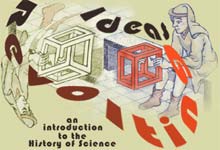
University of California, Irvine
Instructor: Dr. Barbara J. Becker

|
Week 6. Universal Reason On Gravity
|
Quaestions Quaedam Philosophiae
(ca. 1664)
Add. Ms. 3996, Cambridge University Library
On Gravity and Levity
The matter causing gravity must pass through all the pores of a body. [I]t must ascend againe. [1] for else the bowells of the earth must have had large cavitys & inantys to conteine it in, 2 or else the matter must swell it. 3 the matter that hath so forcibly borne [down] the earth & all other bodys to the center (unles you will have it growne to as gross a consistance as the Earth is, & hardly then) cannot if added to gether be of a bulke so little as the earth, for it must descend exceding fast & swift as appeares by the falling of bodys, & exceeding weighty pressure to the Earth.
It must ascend in another forme than it descendeth or else it would have a like force to beare bodys {illeg} that it hath to press them downe & so there would bee no gravity. It must ascend in a grosser consistence than it descends because it may be slower & not strike boddys with so greate a force to impell them upward 2 that it may onely force the outside of a body & not sinke into every pore & then its densness will little availe it because it will yeild from the superficies of a body with ease to run in an easier channell as though it never strove against them.
[I]f it should ascend thinner it can have onely this advantage that it would not hit bodys with so weighty a force but then it would hit more parts of the body & would have more parts to hit with & hit with a smarter force: & so cause ascension with more force than the others could do descension. Wee know no body that not sinke into the pores of bodys finer than aire & it will sink into most if it be forcibly crouded in the stream descending will lay some hould on the streame ascending & so press it closer & make it denser & therefore twill rise the slower. [T]he streame descending will grow thicker as it comes nigher to the earth but will not loose its swiftnesse untill it find a much opposition as it hath helpe from the following flood behind it. [B]ut when the streames meete on all sides in the midst of the Earth they must needs be coarcted into a narrow roome & closely press together & find very much opposition one from another so as either to turne back the same way that they came or croud through one
![]()
On the Gravitating Attraction of the Earth
excerpted from "An Hypothesis Explaining the Properties of Light Discoursed of in My Several Papers"
by Isaac Newton in a letter to Henry Oldenburg, 25 January 1675/76
...so may the gravitating attraction of the Earth be caused by the continuall condensation of some ... aethereall Spirit, not of the main body of flegmatic [slow and sluggish] aether, but of something very thinly and subtily diffused through it ...
[T]he vast body of the Earth ... may continually condense so much of this Spirit as to cause it from above to descend with great celerity [speed] for a supply. In which descent it may beare down with it the bodys it pervades with force proportionall to the superficies [surface area] of all their parts it acts upon...
[N]ature makeing a circulation by the slow ascent of as much matter out of the bowells of the Earth in an aereall form which for a time constitutes the Atmosphere, but being continually boyed up by the new Air, Exhalations and Vapours riseing underneath, at length ... vanishes againe into the aethereall Spaces, and there perhaps in time relents, and is attenuated [reduced] into its first principle.
For nature is a perpetuall circulatory worker.... And as the Earth, so perhaps may the Sun imbibe [drink in] this Spirit copiously to conserve his Shineing, and keep the Planets from recedeing further from him.
And they that will, may also suppose, that this Spirit affords or carryes with it thither the solary fewell [fuel] and materiall Principle of Light.... And that the vast aethereall Spaces between us, and the stars are for a sufficient repository for this food of the Sunn and Planets.
![]()
|